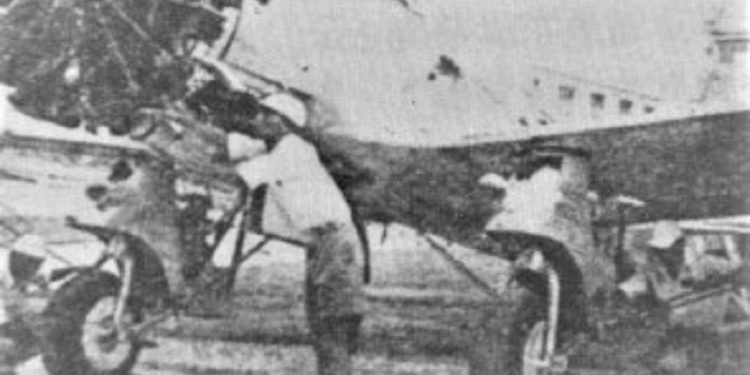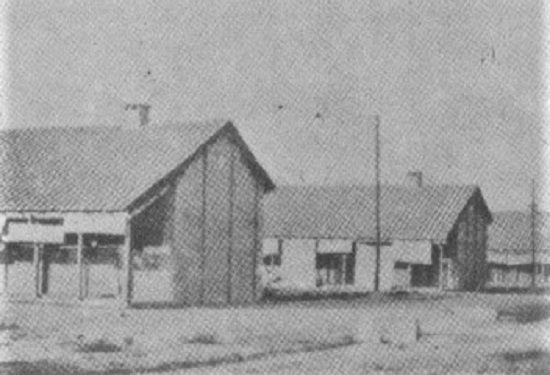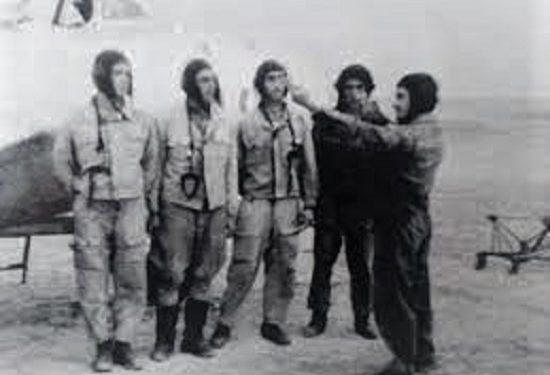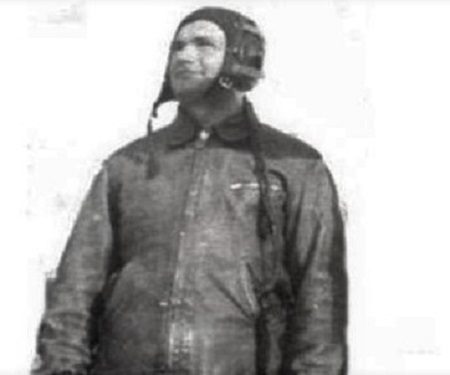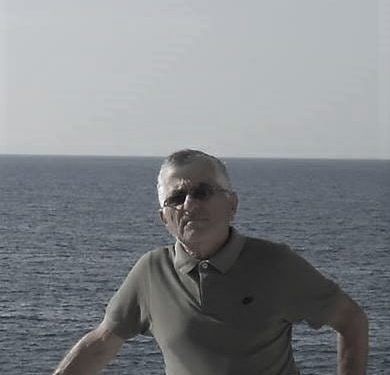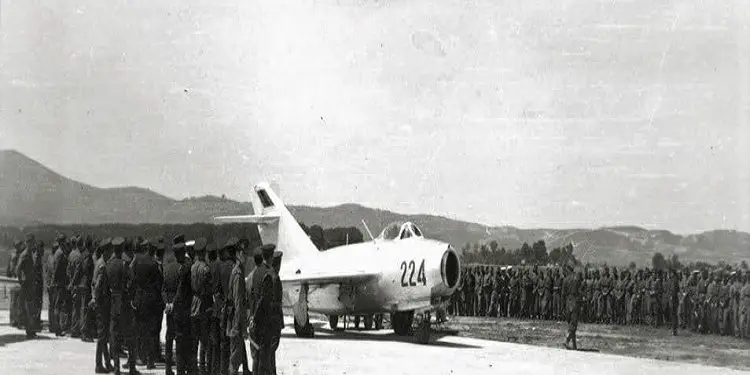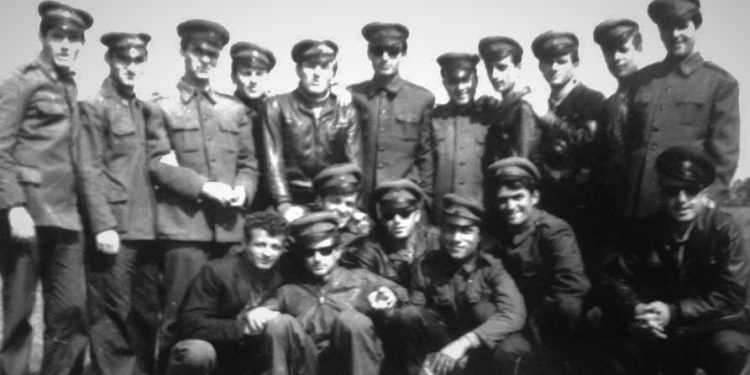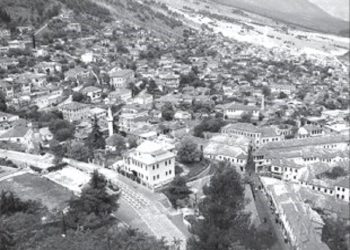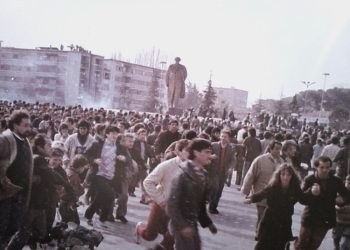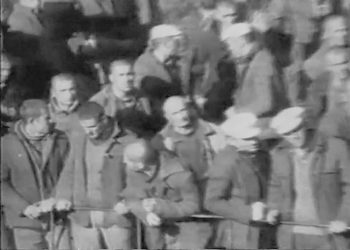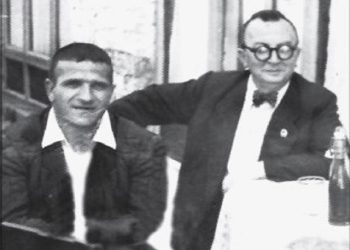By Niazi Nelaj
Part eleven
Memorie.al / Expelled from the Soviet School of Aviation, with dreams cut in half, part of the group of student pilots, who had studied for a year in the city of Bataysk, on January 8, 1962, after a “hell” cruise ”, with a cargo ship, we arrived at the center of China’s Third Military Aviation School in Chin Zhou City. It is located in the “heart” of Manchuria; at that time there were about 200,000 inhabitants. Without any prominent industry. A city with 2-3 story buildings but paved roads. The terrain around the city was plain; next to it are the Western shores of the Yellow Sea. One of the values of this city was the fact that it was the center of China’s Third Military Aviation School. My going to this school and that city was a lucky chance. In the list of 7 students of our course, which included: Adem Çeça, Dhori Zhezha, Mihal Pano, Bashkim Agolli, Andrea Toli and Sherif Hajnaj (Bracki), my name, Niazi Nelaj, was included, quite by chance?
Continues from last issue
– At the Chinese Military Aviation School –
Flying in a jet plane brings you good feelings and gives you unprecedented pleasure. The construction of the ‘Mig-15’ aircraft is “fin”, above the head; the pilot has a window which allows an unrestricted view of the airspace. The sound of the plane’s engine lingers in the background. The speed of the plane is greater; the wings are located behind the cockpit and the maneuverability of the aircraft is great. The pilot in the air has the sensation of tearing the air with his chest, without feeling the surrounding air currents.
The rare beauty was flying in fighter planes. In a single-seat aircraft, when the pilot takes to the air there is a feeling of omnipotence and freedom. It seems to him that he is “his own master and his own stick” and is subject only to the laws of flight science and aviation regulations. At the Sui Xun airfield, the flights went very well. The student from Lushnja, Andrea Petro Toli, who had flown in the MiG-17 aircraft, as early as in Kushovskaja of the former Soviet Union, had no difficulty picking up the process where he had left it. High quality indicators were captured by Fierak student Dhori Nasi Zhezha, who has the talent to quickly grasp the elements of flight and is stable in the air.
Every pilot has a secret. He keeps it to himself and finds it difficult to share it with others. In most cases, he takes with him his secret, kept deep in his soul. The motives that keep him alive are different, internal and personal. The ego is always present. In the first flight in the area, just when I started to perform the combat turn, in the final process of the picture, when the difficulties increase and a lot of coordination is required in the actions, due to the low speed (about 350 km./h), my head covered me and the plane flipped over, on its back.
I was not looking at the natural horizon. I was given to hold the sphere in the center and the control handle still. I waited until the plane dropped to the horizon, then, with smooth, coordinated movements, as the instructor had taught me, I brought it into horizontal flight. I did not report to the air traffic controller, as I knew he would order me off duty and return me to the airfield. I didn’t tell the instructor Liu Shë Mo either; not to give me additional control flights in the area. Sick Sedra prevented me from doing what I needed to do. I told my fellow flight group, Dhori; as girls show each other, the secrets of their hearts, and he suggested how to act if it happened to me next time.
We wanted to complete the flight schedule and return home as soon as possible. We made our request known to the school authorities, presenting the matter as if our departure as part of the Albanian Aviation, under the new conditions (of total isolation from the Warsaw Treaty), was an emergency. The Chinese liked this “argument” and said kind words to us, describing us as patriots who, despite our young age, lived with the pulse of the times. But they did not move a single thread from their plans.
They take things “laid” and do not rush, when it comes to doing it the way they want. Those who will read this article may find it paradoxical, they may not even believe it, but that’s how it was. The annual analysis of Chinese Aviation was held sometime in January 1963. The meeting took place in the capital and lasted a full 21 days. What was said in such a long time, only those who participated in that meeting know. Strange, it seems to us now, but it happened exactly like that. Yet another example; taken from our daily life, at the Aviation School. A Chinese pilot, in order to perform two take-offs “around”, (the duration of a flight “around” is 7 minutes), should do 2-3 days of preparation, from 8 hours each day. What patience did those people have? They surprised us.
They tried to apply their method of preparation with us. The day before the flight, we did 8 hours of preparation. Of this time, approximately half was cockpit practice. The usefulness of this preparation was apparent the next day, when we were about to take off. When the pilot repeats and remembers, memorize the actions, from entering the airplane cabin until exiting it, he will definitely have an easier time in the air. The days were cold but there were also sunny days. Regardless of the weather conditions, the student pilot was obliged to stay in the cockpit, repeating every action, as long as it was provided in the program.
The commander of the four, a red-cheeked “boluc”, (with diarrhea problems), with an open umbrella in his hand, to protect us from the sun, stood on the plane’s cabin when we exercised inside it. Their best argument for forcing us to train so long on the ground was: The training of a fighter pilot costs the Chinese state as much as his body weight in gold. Before this argument, no justification stood. We wanted to, we didn’t want to, we did as those who directed our air training told us.
With various excuses, our flight program was delayed until the end of February 1963. The program of combat use of the Mig-15 aircraft; we did not develop the most important part of the combat preparation. With the argument: “Develop it in the concrete conditions of the country and your guilds”. At the end of the program, we were awarded a diploma. The degree was beautiful; with red color, which the Chinese were very fond of and with the coat of arms of the Chinese Liberation Army.
The diploma stated, in Chinese, that the person had completed the air training program at the Third Aviation School and passed the exams. On a small piece of paper, the size of a diploma, the above text was translated into Russian. The diploma had the person’s photograph and the signature of the commissar and the school commander. My diploma bears the number 0404. In the diploma photo, I came out with a mustache and a Chinese uniform. On the collar of the jacket, the insignia of the student of Aviation, the outstretched wings of a bird can be seen.
We were separated from our friends of the same profession; from students for pilots of the Krasnodar group of explorers. They would continue to fly in MiG-15 jets for several months after our departure. The Chinese escorted us; as they welcomed us, with many people and loud noise. We were quite happy and enthusiastic. Finally, the “blessed day” had arrived when we would take the road back to the Motherland. We missed our people very much. During the time we stayed in China, neither of us received any letters or notices from them. Everything, good or bad, we would learn when we returned to our hearths.
We missed everything Albanian; for stone and wood. We missed Albania and we had no news from it. I am not talking about the political propaganda of the time. We had plenty of that. He who has lived far from his country, I don’t think it will be difficult for him to understand the meaning of that feeling experienced when he takes the long way to return to the hearths of his ancestors, where he left and grew up. . Although we grew up in difficult conditions, even difficulty has its own sweetness, which cannot be exchanged for anything, not even gold.
On April 1, 1963, in the afternoon hours, we left the city of Sui Xun for Beijing on a second-class train. The train was a sleeper. We would travel through the night. We traveled 24 hours; the next day, April 2, 1963, at daybreak, we arrived at the railway station of the Chinese capital. At the station, we were met by senior representatives of the local aviation, in whose company we arranged to spend the night in the hotel of the Chinese army. That night we would rest, relax and make plans for the day ahead.
The hosts gave us the program for the next day. As is the Chinese tradition, our resourceful companions would take us to see some museums and historical sites that we had not seen. The program also included a farewell lunch at the famous “Peking Duck” restaurant, hosted by the Aviation Command of the Liberation Army of China. This restaurant was the destination for hosting delegations and groups of dear friends, as we were.
I had to connect and talk with my close friend, Sherif Çelo Hajnaj (Bracki), who was studying at Peking University to become a Chinese language translator, after being separated from the student pilot group. I made the connection with him from the hotel where I was staying. In the corridors of the hotel, there were a lot of Chinese people. They were surprised by my phone call with the Sheriff. I spoke in a language incomprehensible to them and in a loud voice. Anyway, I agreed with my friend and made an appointment for the next day.
When I left for university, the sheriff asked me for 100 yuan to buy a bicycle. At that time in Beijing, you could get around mostly by bicycle. I had accumulated some money from my savings and made the job easier for my good friend. The time has come to return the borrowed amount, Sherif, since I was returning to Albania. I had to buy some gifts for my people in Albania, as every Albanian does when he returns to his country. The next day, in order to move around the capital easily, the local authorities provided us with a car.
I reconnected with the Sheriff and went to University. My friend was waiting for me at the dormitory door. Together we went up to the room where he lived, which was on the third floor of a 10-story building. The sheriff left the room, on his own business, for about an hour. I sat on a couch, waiting for my friend. Suddenly, a young woman, a friend of my friend, entered the room. She was of Russian origin. We talked in Russian; I treated her as a friend of a friend. An Albanian student, “boluc”, who said he was from Tirana, entered and left the room. The sheriff came and the three of us, with “my” car waiting at the entrance of the boarding house, went to an exhibition of industrial goods, where sales were also made, at “salty” prices.
With the money from my savings and what my friend gave me back, I bought a Polish cloth, for a suit; the most expensive that was advertised at that exhibition. The wood was gray to green, lightly streaked and cast. I also bought a pair of shoes, black, in the shape of a rocket, with spikes, which, in those years, were very popular among young Albanians. At that exhibition, I also bought two pairs of nylon socks, with stripes, quite nice. While my friend and his Russian friend accompanied me, to respect the girl, with a chivalrous gesture, I addressed her: “Buy, for you, whatever you want”! She, surprised, categorically refused.
I, determined in what I said, according to the moral code of my country: “A friend of a friend is honored, first”, bought the girl a bottle of perfume, which she chose herself and gave it to her. She, in the face of my insistence, accepted the modest gift and took the opportunity to thank me, with the words: “I have never seen such a good Albanian”! I must have felt good, but I noticed that my friend also enjoyed it. We were in a hurry. For lunch, we were invited by the commander of the Chinese Aviation to have lunch at the world-famous restaurant: “Peking Duck”. It was the farewell lunch.
At lunch we were in the company of several senior Chinese officers, one of whom made a long farewell speech. He and his colleagues, present at that official event, did not miss an opportunity without praising the fighting friendship between our two peoples and praising the role of their two “great” leaders. The chef of the restaurant, with a rosy complexion, with cheeks that were almost sick with health, clean in his whole being, with a beautiful tray in his hand, presented us with a duck, butchered, placed on the tray he carried in his hand. He, not without bragging, declared: “With this duck you are looking at, I will cook you 18 different dishes”.
It didn’t take long for the Chinese to make what he said a reality. Only the duck tongue was served to us as a separate dish. We ate, drank and made merry. In that warm and friendly environment, we thought about our life in China, since we set foot in Canton, a year or so ago, until we were saying goodbye to the Chinese capital. We thought of delaying the time until the train left for the South by seeing its characteristic objects. Beijing was divided into two: old Beijing and new Beijing. We had seen the ancient objects of the old city when we came; we had to look at the new constructions of the Chinese capital. We had the cars at our disposal and this made our work easier. The new Beijing was expanding and beautifying every day, in front of the old one which seemed to rest a little, in the calmness of the many years it carried on its “shoulders”.
In the evening we gathered at the hotel, earlier than usual. We fell asleep but sleep did not take us. We imagined: what our next voyage to the Motherland would be like. None of us wanted to repeat the ordeal of the previous cruise, with the ocean liner “Durrësi”, a year and a half ago. We believed that the flotilla of the joint Albanian-Chinese sailing company “Çhal” would have been increased with new, faster and more comfortable ships.
However, all the ships of this cruise company were sea transport vehicles intended for the transport of goods, so we could not claim a real tourist cruise. We no longer had that curiosity to see new ports and cities. We had passed through that sea route once. I don’t know for sure if any of my friends slept that night, or if we all pretended to sleep.
Before dawn, we headed south by train. We had traveled this road once and we were not curious about it. Somewhere we turned right and arrived at the port of Cangoni. The Chinese called him Can Gjan. A very nice tourist town with villas, one and two storeys, far from the port, with fantastic gardens and orchards. We had traveled by train for 48 hours when we encountered a miracle. The Chinese, with their fantastic imagination, had miraculously utilized the beautiful nature of the city’s surroundings to set up a perfect tourist and climatic spot.
The city is located east of the Gulf of Tonkin, about 700 km. in the South-West of Canton. The port is smaller than that of Canton and Hong Kong, but the city is quite picturesque. We settled into some fantastic villas on the North-West side of the harbour. Previously, Soviet advisers to the Chinese Liberation Army had resided in those facilities.
It takes a strong pen to describe those rare beauties that our eyes saw 10 days in a row. The one- and two-story villas were at a distance of about 50 m. from one another, connected by alleys, paved with asphalt and flower gardens where roses bloom all year round. The fact that in the South of China, the weather is warm throughout the year, favored the cultivation of flowers of all colors, with a pleasant aroma. Spring had come and the flowers were “mad”.
The beauty of the environment made that city and its surroundings coveted by tourists from different countries. They settled us in those villas, like the dear friends we were, on the run. We had to stay there until the ocean liner “Vlora” was processed in the nearby port and ready to go out into the open sea. The Albanian ship “Vlora” had been added to the flotilla of the joint floating company “Çhal” and was sailing with the Albanian flag, raised on the mast and mast.
We spent the day around that flowery city, playing card games, billiards and ping-pong, and someone engaged in a game of chess. All of us, gathered together, made plans and dreamed about the future. Our group was joined by an agronomist from Vonoi, Vlora district, whose name was Gogo Vjero. This Gogoja had gone to China with a delegation from the Ministry of Agriculture, to spread the Albanian experience in olive cultivation. Memorie.al
The next issue follows




